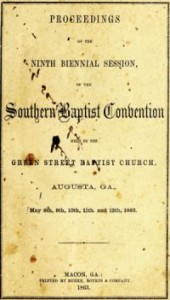 The Southern Baptist Convention convenes for the second day of their annual meeting, hosted by the Green Street Baptist Church of Augusta, Georgia. The august gentlemen assemble at 9 a.m. and following adoption of the Order of Business, delve into business matters and half an hour in “Devotional Exercises.”
The Southern Baptist Convention convenes for the second day of their annual meeting, hosted by the Green Street Baptist Church of Augusta, Georgia. The august gentlemen assemble at 9 a.m. and following adoption of the Order of Business, delve into business matters and half an hour in “Devotional Exercises.”
The Foreign Mission Board report is the highlight of the day’s events. Few missionaries are currently on the field at a time when the war with the North is front and center.
When we last met in the city of Savannah [1861], a portentous cloud overhung our national sky. Many hearts trembled in view of the stupendous preparations made by a cruel enemy, to subjugate our people. But God has wonderfully preserved us. Though the South has been invaded by powerful and fierce armies, and her soil has drank the blood of thousands of her sons, she yet remains before the world, a spectacle of indomitable courage, a monument of Jehovah’s care and kindness. Again we meet, amid the carnage and desolations of war, to confer on interests relating to a kingdom not of this world, to kindle afresh the missionary altar, the fires of devotion, and to encourage each other to higher, holier consecration to the Redeemer’s glory.
The “irregularity of communication” with missionaries, due to the war, is “peculiarly painful.” The board’s administers, in effect, are operating out of scattered locals in the South, some involved in ministries among Confederate soldiers. There are no agents in the field promoting the board and missionaries are forced to fend for themselves. What correspondence there is from the remaining missionaries is a year or more old, while the board’s journal has been suspended. Operations and personnel, in short, are but a shadow of that of pre-war days.
The report from the Board of Domestic and Indian Missions also reflects the impact of the Confederate nation at war. “Most of the Domestic Mission work has been suspended during the war” and there are no agents “in the service of the Board for the collection of funds.” Whereas “more than 150” missionaries were in the field prior to “the breakout out of war,” now a total of seven are listed as employed.
Army Missions, however, is another matter entirely. The pivot to missionary work among Confederate soldiers has been “met with warm sympathy and co-operation of the friends of the land, and the Board were enabled to issue commissions to a number of pious and intelligent ministers.” A total of 26 such men are listed as under appointment. These men report preaching 482 sermons, distributing over 8,000 copies of religious printed material, having 2,598 “religious conversations with individuals,” reclaiming 19 “backsliders,” and witnessing 109 persons professing conversion.
Yet difficult has been the task of “securing money for the men.” Standing firm in this instance on church state separation, Southern Baptists refuse government pay for chaplains and missionaries, thus necessitating the raising of funds from churches. A result of inadequate funding is a relative shortage of Baptist army chaplains and missionaries compared to the Methodists and Presbyterians, who have no qualms about accepting government salaries for their gospel labors.
Decreasing missionary activity among Indians is reported, and no mention is made of efforts to minister to African slaves.
Other reports and business follow before the day draws to a close amid a mood of somberness.
Source: “Proceedings of the ninth biennial session, of the Southern Baptist Convention, held in the Green Street Baptist Church, Augusta, Ga., May 8th, 9th, 10th, 11th, and 12th, 1863” (link)


